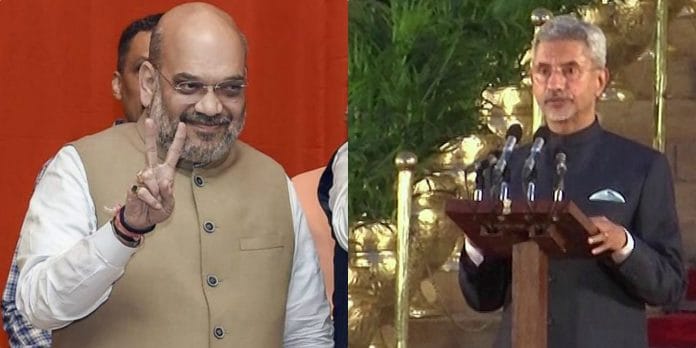New Delhi: Prime Minister Narendra Modi has rejigged his cabinet for his second term in power, giving BJP president Amit Shah the Ministry of Home Affairs and sending the incumbent, Rajnath Singh, to the crucial Ministry of Defence.
Another significant move sees former foreign secretary S. Jaishankar — whose unexpected entry into the cabinet Thursday caused ripples — being included in the ‘top four’, and given charge of the External Affairs Ministry. Nirmala Sitharaman, defence minister in the first Modi cabinet, has been handed the finance portfolio, after Arun Jaitley expressed his desire not to continue due to health reasons. Sitharaman will also head the Ministry of Corporate Affairs.
The Cabinet Committee on Security (CCS) will now have two new faces — Shah and Jaishankar.
The big moves
In tune with his old promise of ‘minimum government, maximum governance’, Modi has clubbed all water-related ministries — drinking water and sanitation, water resources, river development & Ganga rejuvenation — together to make one ‘Jal Shakti’ ministry, to be headed by Gajendra Singh Shekhawat, the MP from Jodhpur, Rajasthan.
In other big moves, Nitin Gadkari will continue to head the Ministry of Road Transport and Highways, along with the additional responsibility of micro, small and medium enterprises. Shipping and water resources have been taken away from him.
Smriti Irani, who started her stint in government with the plum Ministry of Human Resource Development, then handled information and broadcasting before being finally shunted to just textiles due to her controversial tenure, has been given the women and child development portfolio alongside textiles. This means that despite being the biggest giant-killer in this election in defeating Rahul Gandhi in Amethi, she has not had any upward movement portfolio-wise.
Meanwhile, Piyush Goyal, who handled the finance ministry in the absence of Jaitley and even presented the Vote on Account in February, has retained the Ministry of Railways and has additionally been given the commerce and industry portfolio as well.
Former Uttarakhand chief minister Ramesh Pokhriyal ‘Nishank’ has been rewarded with the sought-after HRD ministry. Prakash Javadekar, who handled HRD earlier, will now look after two other key ministries — environment and forest, as well as information and broadcasting.
The allocations to Pralhad Joshi from Karnataka — a first-time inductee in the union cabinet — have come as a big surprise, with him being given three important ministries: Parliamentary affairs, coal and mines.
Ravi Shankar Prasad, who won the election from Patna Sahib in Bihar, will now be in-charge of communications as well as his old portfolios of law and justice and electronics and information technology. He takes over communications from Manoj Sinha, a minister of state who held independent charge but lost the polls from Ghazipur.
Also read: Narendra Modi loves disruption, and the Amit Shah-Jaishankar portfolios prove that
Welfare ministries
For Madhya Pradesh leader Narendra Singh Tomar, the portfolio allocation has brought not just his existing rural development and panchayati raj portfolios but also the agriculture ministry. The BJP had pushed its rural schemes and initiatives aggressively, with PM Modi hailing his government’s achievements in that area. The party’s performance in the Lok Sabha polls has been attributed to these schemes as well.
The department of animal husbandry, dairying and fisheries, earlier under the agriculture ministry, has now been made a full-fledged ministry, with Giriraj Singh given charge of it.
While Mukhtar Abbas Naqvi retains the minority affairs ministry, Arjun Munda from Jharkhand will replace Odisha’s Jual Oram as tribal affairs minister.
What the allies got
There have been no significant changes as far as allies and their portfolios (or statures) are concerned. Lok Janshakti Party’s Ram Vilas Paswan keeps the consumer affairs, food and public distribution portfolios, while Shiromani Akali Dal’s Harsimrat Kaur Badal continues to be in charge of food processing.
Meanwhile, Shiv Sena’s Arvind Sawant, who replaces party colleague Anant Geete, will be Minister of Heavy Industries and Public Enterprise.
Junior ministers
Among the junior ministers, former MoS for Home Affairs Kiren Rijiju has been bumped up to MoS (Independent Charge), handling the Ministry of Youth Affairs and Sports. He will also be Naqvi’s junior in the minority affairs ministry.
Anurag Thakur from Himachal Pradesh, a fresh face in the council of ministers, has been made MoS of two very crucial ministries — Finance and Corporate Affairs.
Pratap Sarangi from Odisha, whose simple lifestyle and demeanour put the spotlight on him, has been made MoS for micro, small and medium enterprises and animal husbandry, dairying and fisheries in his debut.
Also read: Ex-foreign secy S. Jaishankar makes surprise comeback as minister in Modi’s new govt







I expect a huge impact on the Political environment during the next 12 to 18 months in the manner the Political Opponents are dealt with. With a demoralised opposition and a brutal majority, the NDA could either bring about an improvement in social harmony and enhanced security for women and children or fall into the trap of weakening and trouncing the political leaders by vindictive measures, for purely short term gains. It is entirely in the interest of the Ruling Coalition to permit free flow of discussions by encouraging the Media and listening to the voice of dissent, as they become the watch dog for quick and effective (and not efficient) remedial actions by the PMO. Political statesmanship of the highest order is the need of the day as there is no wolf at the door.